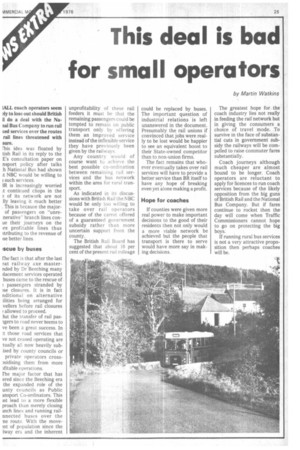This deal is bad for small operators
Page 27

If you've noticed an error in this article please click here to report it so we can fix it.
by Martin Watkins [ALL coach operators seem fly to lose out should British il do a deal with the NaaalBus Company to run rail (ed services over the routes rail fines threatened with sure.
['his idea was floated by tish Rail in its reply to the E's consultation paper on nsport policy after talks .h National Bus had shown Lt NBC would be willing to such services.
3R is increasingly worried .t continued chops in the of its network are not Ily leaving it much better This is because the majorof passengers on "unrenerative" branch lines conue their journeys on the pre profitable lines thus itributing to the revenue of Ise better lines.
Iscue by buses rhe fact is that after the last at railway axe masternded by Dr Beeching many ilacement services operated buses came to the rescue of passengers stranded by !se closures. It is in fact nditional on alternative :Hides being arranged for yellers before rail closures ! allowed to proceed.
3ut the transfer of rail pastgers to road never seems to ye been a great success. In those road services that ye not ceased operating are tually all now heavily subised by county councils or private operators cross3sidising them from more )fitable operations.
the major factor that has ered since the Beeching era the expanded role of the unty councils as Public ansport Co-ordinators. This ist lead to a more flexible proach than merely closing inch lines and running railnnected buses over the ne route. With the move.!nt of population since the lway era and the inherent unprofitability of these rail feeders it must be that the remaining passengers could be tempted to remain on public transport only by offering them an improved service instead of the inflexible service they have previously been given by the railways.
Any country would of course want to achieve the best possible co-ordination between remaining rail services and the bus network within the area for rural transport_ As indicated in its discussions with British Rail the NBC would be only too willing to take over rail operators because of the carrot offered of a guaranteed government subsidy rather than more uncertain support from the county.
" The British Rail Board has suggested that about 10 per cent of the present rail mileage could be replaced by buses. The important question of industrial relations is left unanswered in the document. Presumably the rail unions if convinced that jobs were really to be lost would be happier to see an equivalent boost to their State-owned competitor than to non-union firms.
The fact remains that whoever eventually takes over rail services will have to provide a better service than BR itself to have any hope of breaking even yet alone making a profit.
Hope for coaches If counties were given more real power to make important decisions to the good of their residents then not only would a more viable network be achieved but the people that transport is there to serve would have more say in making decisions. The greatest hope for the coach industry lies not really in feeding the rail network but in giving the consumers a choice of travel mode. To survive in the face of substantial cuts in government subsidy the railways will be compelled to raise commuter fares substantially.
Coach journeys although much cheaper are almost bound to be longer. Coach operators are reluctant to apply for licences to run coach services because of the likely opposition from the big guns of British Rail and the National Bus Company. But if fares continue to rocket then the day will come when Traffic Commissioners cannot hope to go on protecting the big boys.
If running rural bus services is not a very attractive proposition then perhaps coaches will be.




























































































